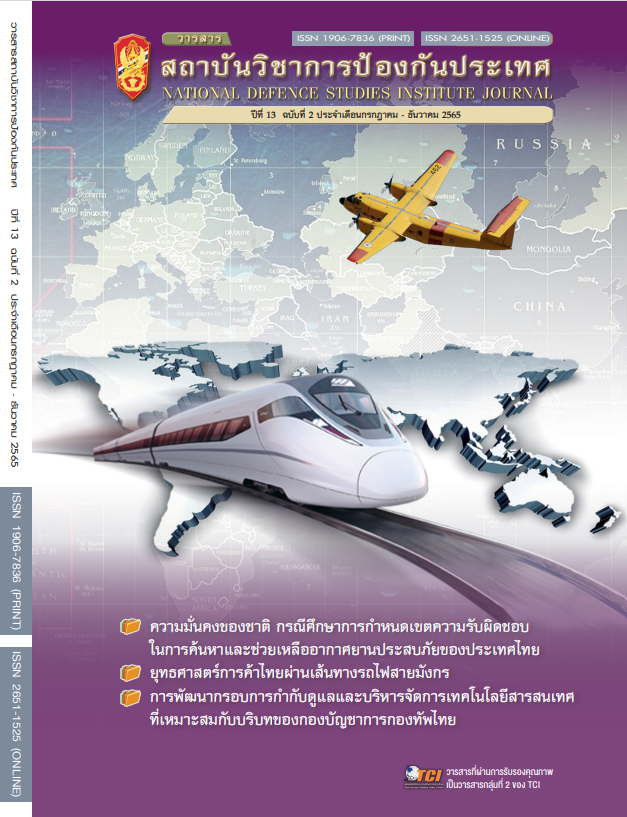Learning Management using Problem Base Learning (PBL) in the Subject of Science, for Second Year Students of Military Technical Training School
Main Article Content
Abstract
Traditional education was organized in such a way that the subject being taught was the main focus. The teacher was responsible for transmitting the content whereas the students were only the receiver, with small engagement in class activities. This could result in the students not being able to apply what was learned in class into practice. It is necessary, therefore, to adjust the learning management model from direct instruction by the teacher to the teacher playing the role of an advisor who offers guidance and suggestions on how to research for knowledge. As such, the students will be able to seek and locate knowledge and apply various skills, as well as develop an understanding on their own.
The problem-based type of education has been applied to the lesson on force and motion in Science, with the purpose of developing life skills for second year students of the Military Technical Training School. This learning management model relies on problems as tools and the teacher is responsible for guiding the students to situations of problems in the real-world context to practice problem analysis and problem solving as groups. The goal is to foster skills that can be applied to problems that students will encounter in the future by using exercises and questionnaires as assessment tools. The results of this learning management model have shown that 84.6% of the students are able to achieve a full score on their exercises and the questionnaires on satisfaction of problem-based learners find that the level of satisfaction is at 97.5%.
Article Details

This work is licensed under a Creative Commons Attribution-NonCommercial-NoDerivatives 4.0 International License.
The articles, images, tables, graphs, written content, and opinions published in this journal are solely those of the authors and do not necessarily reflect the views or positions of the National Defence Studies Institute or its academic affiliates.
References
ขัณธ์ชัย อธิเกียรติ และธนารักษ์ สารเถื่อนแก้ว. (2560). การสอนแบบทันสมัยและเทคนิควิธีสอนแนวใหม่. สืบค้นเมื่อ 2 พฤษภาคม 2565, จาก https://regis.skru.ac.th/RegisWeb/webpage/addnews/data/2017-07-24_078.pdf
ไชยยศ เรืองสุวรรณ. (2553). Active Learning. ข่าวสารวิชาการ คณะเภสัชศาสตร์ มหาวิทยาลัยเชียงใหม่. 53(พฤศจิกายน).
ดุษฎี โยเหลา และคณะ. (2557). การศึกษาการจัดการเรียนรู้แบบ PBL ที่ได้จากโครงการสร้างชุดความรู้ เพื่อสร้างเสริมทักษะแห่งศตวรรษที่ 21 ของเด็กและเยาวชน:จากประสบการณ์ความสำเร็จของโรงเรียนไทย. กรุงเทพฯ: ทิพยวิสุทธิ์.
ไพศาล สุวรรณน้อย. (2559). การเรียนรู้โดยใช้ปัญหาเป็นฐาน (Problem-based Learning: PBL). ในการบรรยายโครงการพัฒนาการเรียนการสอน สถาบันพัฒนาทรัพยากรมนุษย์ ฝ่ายวิชาการ มหาวิทยาลัยขอนแก่น.
เยาวเรศ ภักดีจิตร. (2557). Active Learning กับการพัฒนาผู้เรียนในศตวรรษที่ 21. มหาวิทยาลัยราชภัฏนครสวรรค์.
วิทิวัส ดวงภุมเมศ และวารีรัตน์ แก้วอุไร. (2560). การจัดการเรียนรู้ในยุคไทยแลนด์ 4.0 ด้วยการเรียนรู้อย่างกระตือรือร้น. วารสารมนุษยศาสตร์และสังคมศาสตร์ บัณฑิตวิทยาลัย มหาวิทยาลัยราชภัฏพิบูลสงคราม.
สถาพร พฤฑฒิกุล. (2558). เอกสารประกอบการฝึกอบรม “คุณภาพผู้เรียนเกิดจากกระบวนการเรียนรู้”. สระแก้ว: คณะเทคโนโลยีการเกษตร มหาวิทยาลัยบูรพา วิทยาเขตสระแก้ว


